Prince of Asturias
| Princess of Asturias
Princesa de Asturias | |
|---|---|
|
| |
|
| |
| Style |
His/Her Royal Highness Doña |
| Residence |
The Prince’s Pavilion at the Zarzuela Palace |
| Appointer | The King of Spain |
| Term length | Life tenure or until accession to the throne |
| Inaugural holder | Henry III of Castile |
| Formation | 1388 |
Prince or Princess of Asturias (Spanish: Príncipe/Princesa de Asturias), under the Spanish Constitution of 1978, is the historical and official title given to the heir apparent or heir presumptive to the Spanish throne. It was also the title under the earlier Crown of Castile. The current heir presumptive to the Spanish throne is Leonor, Princess of Asturias, daughter of King Felipe VI and Queen Letizia. Other associated titles originate from some of the other kingdoms that formed Spain: Prince of Viana (for Navarre), Prince of Girona (for Aragon), Duke of Montblanc (for Catalonia), Count of Cervera (for Valencia) and Lord of Balaguer (for Majorca).
Military dictator Francisco Franco appointed Juan Carlos de Borbón as his "successor with the title of king" but gave him the new title of Prince of Spain instead of Prince of Asturias.
Felipe VI, during his tenure as Prince of Asturias, instituted what is now called the Princess of Asturias Awards.
Príncipe de Asturias Peak in Vinson Massif, Antarctica is named after the Prince of Asturias.
History
After the death of King Peter in 1369, the Crown of Castile was drawn yet deeper in a civil war, disputes and long rivalled between English claimant, John, Duke of Lancaster, and two successive Trastámara claimants, Henry II and his son John I. After two decades of conflicts of varying intensity, the parties arrived at compromise through means of marriage: the future Henry III (1379–1406) was married to Catherine of Lancaster in 1388. A part of the pact ("Accord of Bayonne") was to elevate the young couple to a title, Prince and Princess of Asturias, which was modelled after that of Prince of Wales in England. The title was to belong to the official successor of the Castilian throne. Thus the first Prince and Princess of Asturias were Henry of Castile and Catherine of Lancaster.
In the first years the title was not only honorary, as it included the ownership of the territory of Asturias; the Prince ruled the Principality in representation of the King and was able to appoint judges, mayors, etc. This was changed by the Catholic Monarchs, who limited the scope of the title making it merely honorary; this decision was upheld by the members of the House of Habsburg and the House of Bourbon until the present day.
List
| Image | Name | Heir to | From | Until | |
|---|---|---|---|---|---|
| Year | Cause | ||||
 | Henry (1379–1406) | John I (father) | 1388 | 1390 | ascended the throne as Henry III |
 | Maria (1401–1458) | Henry III (father) | 1402 | 1405 | displaced by the birth of brother |
 | John (1405–1454) | 1405 | 1406 | ascended the throne as John II | |
.svg.png) | Catherine (1422–1424) | John II (father) | 1423 | 1424 | died |
.svg.png) | Eleanor (1423–1425) | 1424 | 1425 | displaced by the birth of brother | |
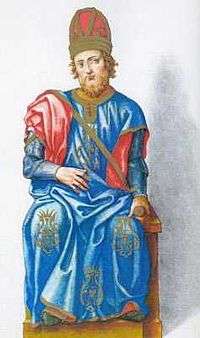 | Henry (1425–1474) | 1425 | 1454 | ascended the throne as Henry IV | |
 | Joanna (1462–1530) | Henry IV (father) | 1462 | 1464 | disinherited in favour of half-aunt |
_-_Tumba_de_Alfonso_de_Castilla_-_Detalle.jpg) |
Alfonso (1453–1468) |
Henry IV (half-brother) |
1465 | 1468 | died |
 |
Isabella (1451–1504) |
1468 | 1470 | disinherited in favour of half-niece | |
 |
Joanna (1462–1530) |
Henry IV (father) |
1470 | 1474 | crown assumed by Isabella I |
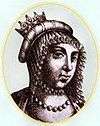 | Isabella (1470–1498) | Isabella I (mother) | 1476 | 1480 | displaced by the birth of brother |
 | John (1478–1497) | 1480 | 1497 | died | |
 | Isabella (1470–1498) | 1498 | 1498 | died | |
.svg.png) | Miguel (1498–1500) | Isabella I (grandmother) | 1499 | 1500 | died |
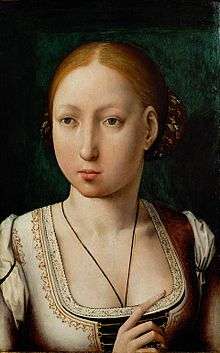 | Joanna (1479–1555) | Isabella I (mother) | 1502 | 1504 | ascended the throne |
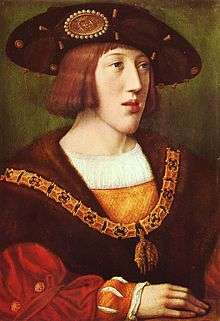 | Charles (1500–1558) | Joanna (mother) | 1504 | 1516 | ascended the throne as Charles I |
.jpg) | Philip (1527–1598) | Charles I and Joanna (father and grandmother) | 1528 | 1556 | ascended the throne as Philip II |
 | Carlos (1545–1568) | Philip II (father) | 1560 | 1568 | died |
 | Ferdinand (1571–1578) | 1573 | 1578 | died | |
 | Diego (1575–1582) | 1580 | 1582 | died | |
 | Philip (1578–1621) | 1584 | 1598 | ascended the throne as Philip III | |
 | Philip of Austria (1605–1665) | Philip III (father) | 1608 | 1621 | ascended the throne as Philip IV |
 | Balthasar Charles (1629–1646) | Philip IV (father) | 1632 | 1646 | died |
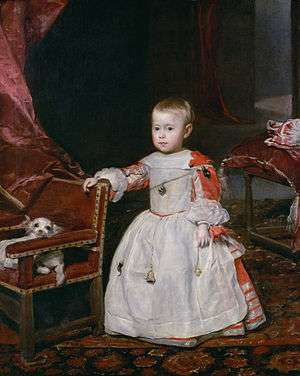 | Philip Prosper (1657–1661) | 1658 | 1661 | died | |
 | Charles (1661–1700) | 1661 | 1665 | ascended the throne as Charles II | |
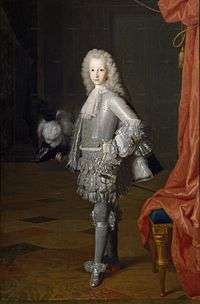 | Louis (1707–1724) | Philip V (father) | 1709 | 1724 | ascended the throne as Louis I |
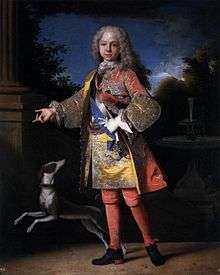 | Ferdinand (1713–1759) | 1724 | 1746 | ascended the throne as Ferdinand VI | |
_-_02.jpg) | Charles (1716–1788) | Charles III (father) | 1760 | 1788 | ascended the throne as Charles IV |
 | Ferdinand (1784–1833) | Charles IV (father) | 1789 | 1808 | ascended the throne as Ferdinand VII |
.jpg) | Isabella (1830–1904) | Ferdinand VII (father) | 1830 (1833)[1] | 1833 | ascended the throne as Isabella II |
 | Isabella (1851–1931) | Isabella II (mother) | 1851 | 1857 | Displaced by the birth of her brother |
 | Alfonso (1857–1885) | Isabella II (mother) | 1857 | 1868 | mother's deposition |
 | Emmanuel Philibert (1869–1931) | Amadeus | 1871 | 1873 | father's abdication |
.jpg) | Isabella (1851–1931) | Alfonso XII (brother) | 1875 | 1880 | displaced |
| Mercedes (1880–1904) | Alfonso XII (father) Alfonso XIII (Brother) | 1880 1886 | 1885 1904 | displaced | |
_(cropped).jpg) | Alfonso (1907–1938) | Alfonso XIII (father) | 1907 | 1933 | renounced his succession rights |
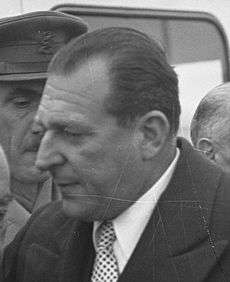 | Juan (1913–1993) | 1933 | 1941 | Recognized as heir apparent to the Spanish throne and held the title in pretense from 21 June 1933, but preferred to use the title Count of Barcelona; renounced his claim to the throne in favor of his son, Juan Carlos on 14 May 1977 | |
 | Felipe (1968–) | Juan Carlos I (father) | 1977 | 2014 | ascended the throne as Felipe VI |
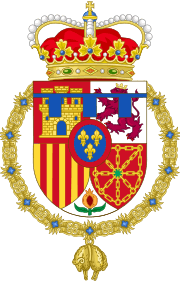 | Leonor (2005–) | Felipe VI (father) | 2014 | Incumbent | |
See also
- Asturias
- Asturias, Cebu, Philippines
- Prince of Spain
- Princess of Asturias (by marriage)
- Monarchy of Spain
- Princess of Asturias Awards
- Spanish aircraft carrier Principe de Asturias
- List of titles and honours of the Heir Apparent to the Spanish Throne
References
- ↑ Proclaimed Princess of Asturias by a Royal Decree of 13 October 1830 and sworn as the heir to the throne on 20 June 1833
